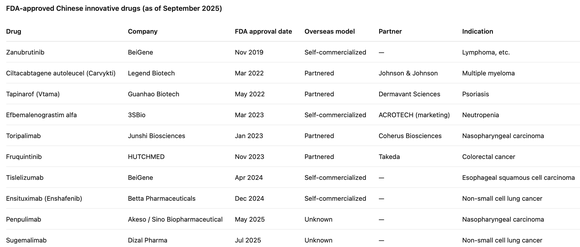China's drug exports are dominated by APIs, which may be spared Trump's new 100% tariffs, but the impact on innovative therapies remains unclear.

Photo from Jiemian News
by LI Kewen
U.S. President Donald Trump said he will impose a 100% tariff on all branded and patented drugs from Oct. 1, a move that could complicate Chinese companies' expansion in the U.S. and unsettle the global pharmaceutical supply chain.
Trump said companies building plants in the U.S. would be exempt but did not specify details. Analysts expect generics to be spared, leaving costly branded drugs as the main targets.
China exported US$19.05 billion in pharmaceuticals to the United States in 2024, including US$6.43 billion in chemical drugs and US$870 million in traditional Chinese medicines (TCMs). Active pharmaceutical ingredients (APIs) accounted for about 70% of chemical-drug exports, or roughly US$4.5 billion, a category unlikely to be hit by the tariffs.
The main risk is for a small number of China-developed therapies already approved in the U.S., such as BeiGene's Brukinsa, a cancer therapy, and Legend Biotech's Carvykti, a cell therapy co-developed with Johnson & Johnson. Others such as Junshi Biosciences, HUTCHMED and 3SBio could also be exposed.

Most Chinese firms have licensed U.S. rights to partners such as Johnson & Johnson, Takeda and Coherus BioSciences, which run American plants and may qualify for exemptions. Those pursuing direct commercialization, including BeiGene and Betta Pharmaceuticals, face greater uncertainty. BeiGene opened a manufacturing site in New Jersey last year, and Legend Biotech is also building facilities in the U.S. Executives note the impact will hinge on how customs values are set: if duties are applied to retail prices rather than declared costs, the burden could be far heavier.
The tariff underscores the fragility of a supply chain shaped by global specialization. China produces about 30% of the world's APIs and 80% of intermediates; India leads in generics, while Ireland and Switzerland focus on high-end formulations. The U.S. depends heavily on imports, sourcing 80% of its APIs from abroad — including 95% of ibuprofen, 91% of hydrocortisone and 70% of acetaminophen from China.
Global drugmakers are already expanding U.S. capacity. Eli Lilly, Novartis, Roche, AbbVie and Sanofi have all announced new plants this year to hedge political risks. Large firms are expected to cope better than smaller rivals.
WuXi Biologics CEO CHEN Zhisheng said drugmakers once saw little need to build plants in multiple regions, as production in China was cheap and efficient, and that political risks since the 2018–19 trade war have forced diversification. "But if cost efficiency is the priority, China remains the most competitive option," he said.